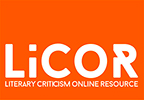What kinds of skills do you need to develop in order to interpret or analyse literature? We think the following abilities might come in handy:
Knowledge Different literary genres play by different rules and use different tools. You need to know, for example, the difference between a poem and a novel and the difference between a speaker and a narrator to be able to discuss these genres with precision. LiCOR aims to provide this knowledge.
Language Skills It is important to be aware of how authors, playwrights and poets distribute certain words in certain ways and how word choices and word order determine meaning.
Reading Stories Narratives can divulge or hold back information, and present it in chronological or non-chronological order. We need to understand how the presentation of a story affects its meaning, themes and moods.
Symbol and Metaphor Literature habitually contains meanings that are different from or that go beyond the literal ones. Being able to interpret the metaphorical or symbolic sense of a piece of writing is vital to understand what it really says.
Style The combination of linguistic method, narrative technique, use of metaphor, and more, together make up an author’s style. Possessing the above skills will enable you to comment on the stylistic features of a piece of writing.
Gaining a meta-perspective on literature through obtaining these skills will not only give you the ability to write better essays (if you are a student). We also think that the more you know about these things the better equipped you will be to critically assess articles in newspapers, journalism, documentaries, political rhetoric, contributions to debates about societal matters, discussions with friends, advertisements, song lyrics and – basically – any use of language and narrative attempting to influence your opinions or manipulate your emotions.
As mentioned, we also believe that honing your literary skills might help you to derive more pleasure from reading novels and poems, and other stories and art forms, like computer games, comic books, films and TV shows.
